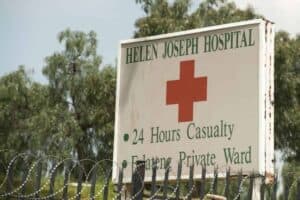The STEPS Foundation helps to treat children born with the defect in public hospitals using the internationally endorsed Ponseti Method that excludes surgery.

After the news that her child had been born with a severe case of talipes equinovarus, also known as clubfoot, a young mother is now on her way to witnessing her daughter taking her first steps more than four years later.
Nthabiseng Mokoena recalled the moments after the birth of her daughter in April 2015 as “confusing” when the doctor told her about her child’s musculoskeletal birth deformity. She had not heard of the word before then.
Her child was referred to the Chris Hani Baragwanath Hospital’s Clubfoot Clinic where she had her first encounter with the STEPS Foundation, an organisation that treats children born with clubfeet, trains medical practitioners and educates parents about the defect.
After travelling from her East Rand home to the hospital in Soweto for her daughter’s routine check-ups and treatment for over four years, Mokoena said she was happy with her child’s progress.
“My child is now four years old and everything has improved. Although she may not be able to walk long distances because of another spinal defect, I am happy she is getting help,” said Mokena, whose face lit up as she spoke.
Mokoena’s child is one of about 150,000 to 200,000 children affected by clubfoot each year, with about 2,000 of them born in South Africa.
The southern African black population is said to have the second-highest rate of clubfoot in the world with an estimated one in 500 affected babies born in the region every year. It also occurs twice as frequently in boys.
Karen Moss, founder of the STEPS Foundation who gave birth to a son with clubfoot years previously, explained that clubfoot could occur genetically as couples with family histories of it have a higher chance of giving birth to a child with the defect.
However, the causes of the defect have not been scientifically proven yet.
She said while the condition was not painful for the newborn, an untreated clubfoot could result in complications as the child grew, including not being able to walk for life.
Partnering with the public health sector and doctors, particular those affiliated with the South African Paediatric Orthopaedic Society, the foundation helps to treat children born with the defect in public hospitals using the internationally endorsed Ponseti Method that excludes surgery.
Moss said: “Beneficiaries are predominantly children attending state clinics, from birth to five years old. The families are from low-income households, they have not received adequate prenatal care and do not have access to clubfoot education.
“We change these children’s lives by ensuring they have correct, effective treatment and can be healthy, contributing members of their communities and society.”
For more news your way, download The Citizen’s app for iOS and Android.







